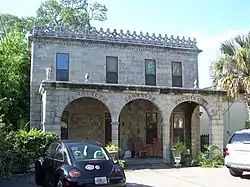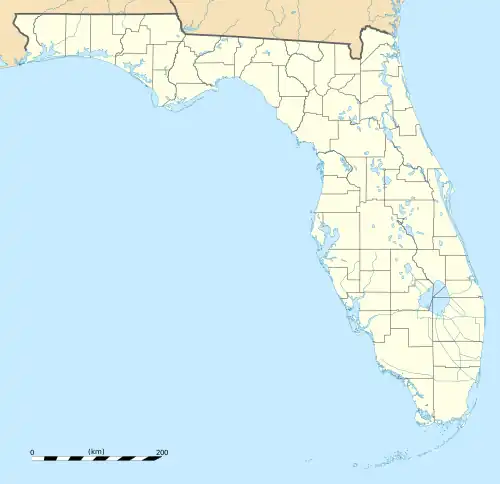Horace Walker House | |
 | |
  | |
| Location | St. Augustine, Florida |
|---|---|
| Coordinates | 29°54′12″N 81°19′14″W / 29.90333°N 81.32056°W |
| Area | 2,250 sq ft (209 m2)[1] |
| Architect | Franklin W. Smith |
| Architectural style | Masonry Vernacular |
| NRHP reference No. | 98000026[2] |
| Added to NRHP | January 30, 1998 |
The Horace Walker House, also known as Castillo Sebastian is a historic home in St. Augustine, Florida built around 1888. It is located at 33 Old Mission Avenue, near the north city gate. On January 30, 1998, it was added to the U.S. National Register of Historic Places.
The house was erected using mold-formed concrete blocks, commonly called "artificial stone". Smith was the first to make concrete blocks that used crushed coquina instead of sand, along with Portland cement. In the late 19th century, this type of construction was new but the blocks used display the same characteristics: smooth/rough opposite surfaces, plus iron rods used for structural reinforcement.
The two-story, two bedroom, two bath house is one of St. Augustine's smallest examples of Moorish Revival architecture. The flat roof with decorative parapets are typical for the style; as is the front porch with five Tuscan arches—three facing the street. The interior is ornate, with heart of pine floors; the doors and ceilings feature carved wood. The central element is a double staircase with a landing between.[3]
The structure was designed by Franklin W. Smith, who also constructed Villa Zorayda, his personal residence in St. Augustine, and the Casa Monica Hotel, which was sold to Henry Flagler.
References
- ↑ "33 OLD MISSION AVE" St. Johns County Property Appraiser
- ↑ "National Register Information System". National Register of Historic Places. National Park Service. July 9, 2010.
- ↑ Bagwell, Levette: "Memories of Old Mission Avenue's Castle House" St. Augustine Record, May 8, 1998